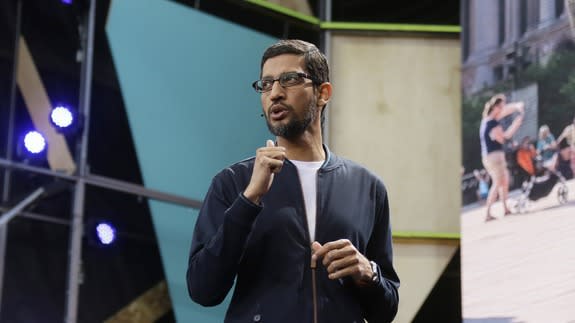Google just revealed its strategy to rule the post-search world. Will it work?

Google CEO Sundar Pichai had good reason to be excited Wednesday. Pichai, who is probably most often described as "subdued," was unusually energized as he emceed his team through a host of product announcements — several genuinely impressive.
He kicked things off with Google Home, the company's answer to Amazon Echo. Then came Allo and Duo, a pair of messaging apps that look well poised to compete with the likes of WhatsApp and Apple's FaceTime. And Android Instant Apps — apps that download themselves directly from links — could change the face of mobile, ending (or at least mitigating) the cold war between apps and the mobile web.
Underneath all the excitement, however, there's a sense that Google is afraid.
SEE ALSO: Android Nougat? Android Nachos? Google wants you to name Android N
It's no coincidence that most of Google's announcements directly compete with products from others. Gadgets like the Echo and apps like Facebook Messenger aren't just popular services, they're changing the way we interact digitally. More to the point, they're shifting our experiences away from searching the web and using apps themselves, areas that Google dominates and are responsible for most of its revenue.
Why Google is scared
There's a reason people are turning away from traditional search and toward more and more new interfaces like voice interaction: convenience. When you need something — be it your calendar, a weather report, an Uber or even just a cat video — it's just simpler (or more "natural," if you prefer) to ask for it, out loud, than to reach for a device and commence tapping, swiping and waiting for various screens to load.

Image: Eric Risberg/AP
Of course, Google's been doing voice and digital assistants for years, but today it showed it now understands playing the convenience game means more than just having good back-end technology. That tech also needs to have the right pathway to the user. That's one area the Echo got exactly right — it's the talking speaker we never knew we wanted.
With Home and Allo, Google finally appears to have the right vehicles to meet users where they are, even if others got there first. Home is basically a clone of the Amazon Echo, but one of the Echo's weaknesses is that very little of our digital lives is lived on Amazon, so it relies on (often shaky) connections to other services to offer that full picture. With its ubiquitous services, Google is arguably in a better position to connect its smart speaker with our digital selves.
With Allo, Google may finally give people a reason to use a Google messaging app instead of Snapchat, WhatsApp, Slack, Viber or one of the many other messaging apps, all of which seem to work better than Hangouts. The wild card here is, again, the interactions (which are sort of like a supercharged Slackbot) that could keep users coming back simply because it's more convenient than launching a bunch of disparate apps.
All of this, if it works, translates into more users spending more time in Google services — a trend that, as our reliance on traditional search declines, often points the other way.
Even Android Instant Apps is part of this. It's no coincidence that the demo started with a Google search, but ordinarily a user would have been directed to download an app, a permanent window in their home screen that leads to a service that Google is more than likely not a part of.
With Instant Apps, the search link still downloads an app, but it does so invisibly, gives the user the best experience, lets them pay for things with their Google account, and then it goes away — no permanent home screen real estate lost. Want to buy or do something else? Just come back to Google, and we'll handle it. Everybody wins.
History is against Google
Well, except for Facebook, or Microsoft, or Amazon — all of which are fighting this same war over consumer attention with their own platforms. Whether or not Google's I/O broadside will give it an edge depends on execution, and if history is any guide, it'll be a mixed bag.

Image: Eric Risberg/AP
Hangouts (which Allo and Duo essentially replace) and Google Now (which the Google assistant evolved from) were well-received when launched, but both have suffered confusing purposes and interfaces. Google Now isn't even a proper app on Android, and Hangouts is a mess, with an unsatisfying mix of features that don't compare well with what's available on other services.
With its announcements at I/O 2016, Google has shown it's very much aware of this. It knows it let others take the lead in key product areas, which is why it didn't simply try to revamp Hangouts or wait for its sister company, Nest, to build a smart home hub. It didn't need to just show something new, it needed to show a new way of doing things.
At least that was the message; behind the scenes it may be another matter. Google is a sprawling, 60,000-person company with many different and sometimes redundant services, all glued onto the central cash engine of search and ads. Are Allo, Home, Instant Apps and the new assistant just a shiny coat of paint on on the old Google? Or has it really turned a corner in its approach?
That's what will determine Google's fate in the next platform war. Not the Duo's knock-knock feature or Google Home's ability to understand small children or how many apps it recruits for its Instant Apps program. The tech was never the problem. Google needs to put the experience above all else — even above its aging search-and-ads business model. The feature Google needs to offer is seamlessness.
Only then will it have nothing to fear.
